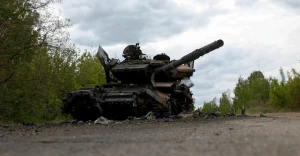
Actual Orwell. War de jure and de facto
The ink has not yet dried on the protocols with the results of Russia's fake election of the so-called president, and the world created for the inhabitants of the pseudo-empire is already cracking under the weight of insane propaganda
The Orwellian narrative of "war as peace" has recently been personally peddled by Putin's press tongue, Dmitry Peskov.
For the first time, he referred to the bloody massacre unleashed by the Kremlin in Ukraine not as a 'special military operation,' as it has been conventionally termed until now, but as a 'war.' 'We are in a state of war. Yes, it started as a special military operation, but as soon as this gang emerged and the collective West became involved on the side of Ukraine, it became a war for us. I am convinced of this. And everyone should understand this for their own internal mobilization,' Peskov stated.
This revelation was obviously not addressed to the "collective West," which is an ally of Kyiv. Clearly, the main emphasis is shifted towards the domestic audience, those who flooded the polling stations to demonstrate their loyalty to the authoritarian regime. Now they are being demanded "internal mobilization," which will soon turn into a real one. "It's a special military operation de jure. But de facto, for us, it has turned into a war, after the collective West increasingly and directly increases its involvement in the conflict," Peskov insists.
And the question is not about the verbosity of the Kremlin mouthpiece. It's not about the desire to justify the military terminology with the militarism of the West or, as they like to say in Moscow, "Ukrainian Nazism."
The essence of the Kremlin's new rhetoric is to demonstrate a sense of "no way out" before the necessity of war, attempting - not for the first time - to present Putin's criminal adventure as a new "patriotic war," as an existential choice, in which, if mistaken, Russians will find themselves in the once-promised "nuclear paradise."
Peskov's words sounded like a sinister prelude to a well-rehearsed Kremlin scenario: a few hours later, Crocus City Hall in Krasnogorsk near Moscow was engulfed in flames. Once again, the FSB used its worn-out playbook. Initially, it was claimed that Ukrainian terrorists had planted explosives during the concert, causing nearly a hundred casualties. Subsequently, ISIS claimed responsibility for the massacre. However, despite warnings from the United States, the FSB did nothing to prevent the terrorists. Thus, the chain from the Kashirskoe Highway in 1999 to Nord-Ost in Dubrovka in 2002 found its logical continuation. It was a modified Putin-style "flush it down the toilet" response.
Even the Orthodox warrior-oligarch Konstantin Malofeev spoke out, albeit very clumsily, invoking an analogy with Chechnya: "After the horrific terrorist attack in Nord-Ost, we won in Chechnya. Let's give the peaceful population of Ukraine 48 hours to leave the cities, and finally end this war with a victorious defeat of the enemy." This war, as Peskov emphasized.
For the West, China, and the Global South, Peskov and his boss have different words and tones. They tirelessly talk about Russia's readiness for peaceful negotiations, wrapping pacifist slogans in imperialist rhetoric. They say, "We are not against reconciliation with Ukraine, but..." But Ukraine must give the territories we annexed, acquire neutral status, limit its military quantitatively, and so on. It would take fingers on both hands to enumerate all of Putin's "wants."
According to Peskov's recent speeches, territorial ambitions extend beyond the criminally annexed Donetsk, Luhansk, Kherson, and Zaporizhzhia regions within their administrative boundaries.
Essentially, it's about the capitulation of Ukraine, because, of course, having achieved what he desired, the bunker old man won't stop. Quite Orwellian: "If you want a vision of the future, imagine a boot stamping on a human face — forever."
Imagined?.. Unfortunately, this image doesn't impress many politicians in the West, who, while ostensibly declaring their support for the idea of Ukrainian victory, consider it a secondary matter. As long as the war is far away, according to politicians and policymakers in the United States and Europe, it is necessary to address their own problems first. And, as wild and cynical as it may seem — at the expense of Ukraine.
I think Moscow wouldn't be as verbose and rude if it hadn't heard candid admissions from Western "experts" and "anonymous sources" about their desire to play "Ukrainian conflict" poker from the capitals over there. Because what does it boil down to? Russia has been systematically destroying Ukrainian cities, infrastructure, environment, killing tens of thousands for the third year in a row, and Ukrainians dare to strike back at the aggressor's oil refineries? But of course—because the average Hans or John will have to shell out extra euros or dollars to fill up their car tanks... It's unheard-of audacity!
Indeed, especially when considering that such methods of modern warfare are outlined in NATO documents—the Alliance that still, fortunately, serves as a security umbrella for all these advisors and consultants of Ukraine.
I emphasize the word "still" because times are uncertain. So that with time, we don't find ourselves in a situation where the well-maintained oil refineries in Russia, cared for by the concerned West, start producing diesel fuel for tanks destined to roll towards the English Channel…
It's interesting how Western strategists will interpret such a maneuver: as a de facto war or just de jure?
No matter what they say, Orwell will remain relevant — for Hans and John, and for the politicians they elect: "War is a way of shattering to pieces, or pouring into the stratosphere, or sinking in the depths of the sea, materials which might otherwise be used to make the masses too comfortable, and hence, in the long run, too intelligent."
Especially for Espreso
About the author. Ihor Hulyk - journalist
The editorial board does not always share the views expressed by blog authors.
- News














































